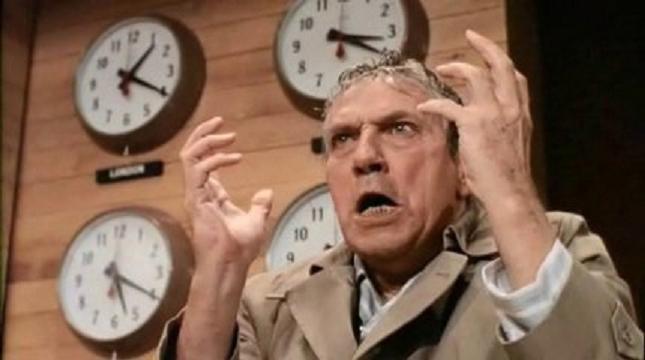Peter Finch as Howard Beale: “But first you’ve got to get mad. And I’m mad as hell, and I’m not going to take this anymore!” The complete film posted at Google Video here.
We had something else lined up for tonight, but it feels sort of zeitgeisty that, after posting multiple entries yesterday on obscenity and satire (here, here, here, and here), as well as featuring Jon Stewart’s inspired tirade on The Daily Show the other night — and even putting up video earlier today that perfectly captures the inanity of what now passes for television news — tonight’s movie offering should be Paddy Chayefsky’s classic, deadpan satire Network. Those of us who are old enough to have seen it when it was released in 1976 may recall the queasy feeling back then that it was a grotesque extrapolation of social trends that could not “really” descend so low. What dreamers we were. How sweet our innocence. But for anyone who grew up during the evolution of the 24 hour news cycle and the proportional devolution of news into ideologically mutant infotainment, not to mention the onset of the multiple myeloma that is CNN and Fox News, this wonderful movie will not be so much “satire” as documentary.
Again, for those old enough to remember, this is the great Peter Finch‘s last role, and it is a tour de force, playing the divinely demented Howard Beale, the staid old school newsman who becomes a deranged but truth-speaking prophet. For those too young to have seen Peter Finch before now, this performance will be a revelation. They don’t make actors like this any more. And he makes it look so easy.
This film is not available on YouTube, but Google video has posted it in its entirely. Just hit the link at the top of the post. (Be aware that the last 16 minutes of the film appear as “Part 2” at the above link.)
Here’s Frye on the “satire of the high norm“:
This technique of disintegration brings us well into the third phase of satire, the satire of the high norm. Second-phase satire may make a tactical defence of the pragmatic against the dogmatic, but here we must let go even of ordinary common sense as a standard. For common sense too has certain implied dogmas, notably that the data of sense experience are reliable and consistent, and that our customary associations with things form a sold basis for interpreting the present and predicting the future. The satirist cannot explore all the possibilities of his form without seeing what happens if he questions these assumptions. That is why he so often gives to ordinary life a logical and self-consistent shift of perspective. He will show us society suddenly in a telescope as posturing and dignified pygmies, or in a microscope as hideous and reeking giants, or he will change his hero into an ass and show us how humanity looks from an ass’s point of view. This type of fantasy breaks down customary associations, reduces sense experience to one of many possible categories, and brings out the tentative, als ob [“as if”] laws of all our thinking. Emerson says that such shifts of perspective afford a “low degree of the sublime,” but actually they afford something of far greater artistic importance, a high degree of the ridiculous. (Anatomy, 1957 ed., 234-5)

